Research Proposal: Celebrity Endorsement Impact on Fan Brand Loyalty
VerifiedAdded on 2023/04/19
|12
|3987
|271
Project
AI Summary
This research proposal investigates the impact of celebrity endorsements on fan brand loyalty. It explores whether fans' loyalty to a brand is tied to the celebrity endorsing the product or service. The study proposes using questionnaires to collect quantitative data from 400 participants aged 18-25 at Durham University. The research will analyze attitudinal and behavioral loyalty before and after a brand spokesperson change. The methodology includes data collection via social media and email, with incentives for participation. The study aims to test hypotheses regarding the relationship between celebrity endorsements and brand loyalty, and the potential decrease in fan loyalty when spokespersons change. Ethical considerations, including voluntary participation and anonymity, are addressed. The data will be analyzed using SPSS to determine if fan brand loyalty is tied to their idols.
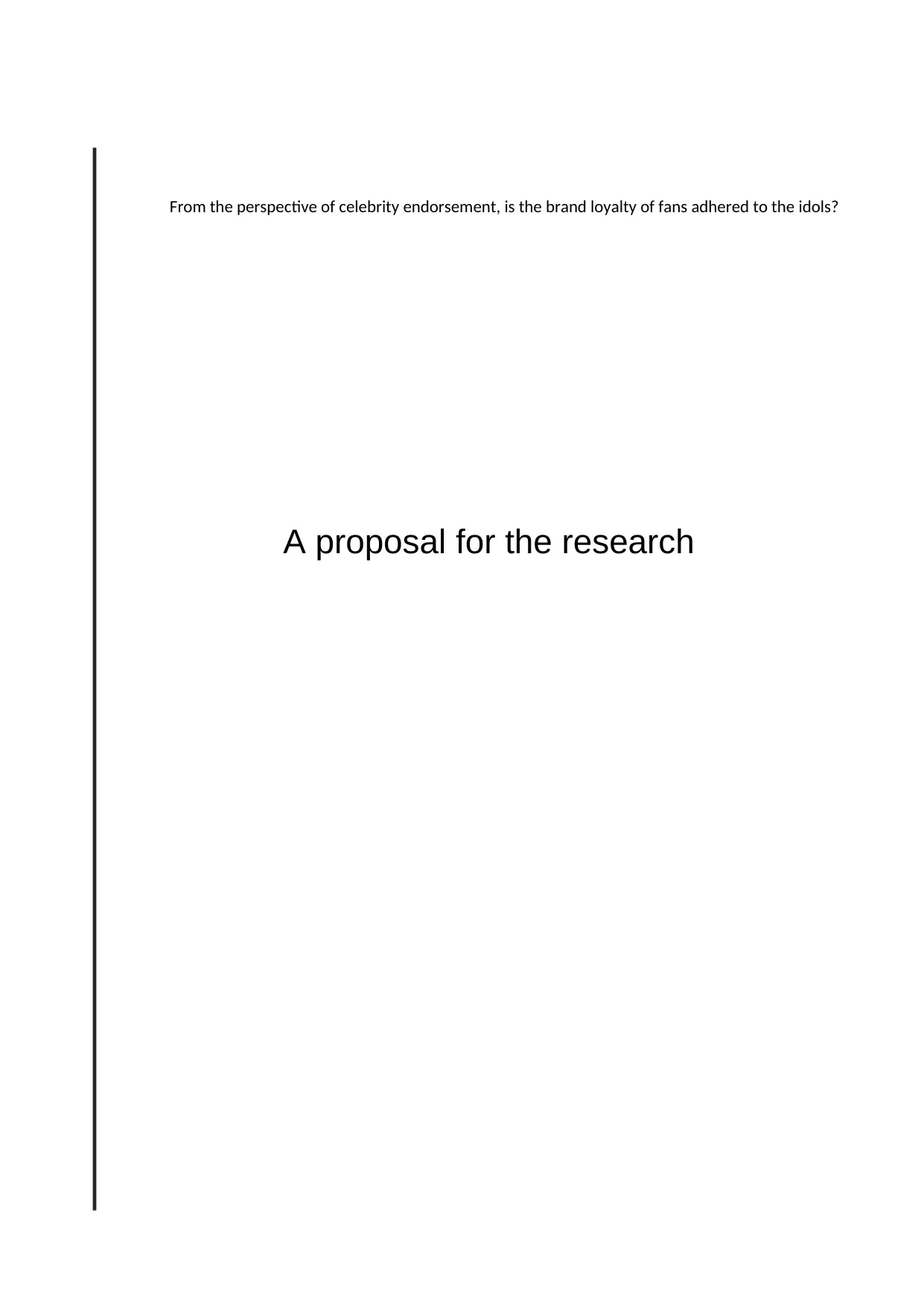
From the perspective of celebrity endorsement, is the brand loyalty of fans adhered to the idols?
A proposal for the research
A proposal for the research
Paraphrase This Document
Need a fresh take? Get an instant paraphrase of this document with our AI Paraphraser
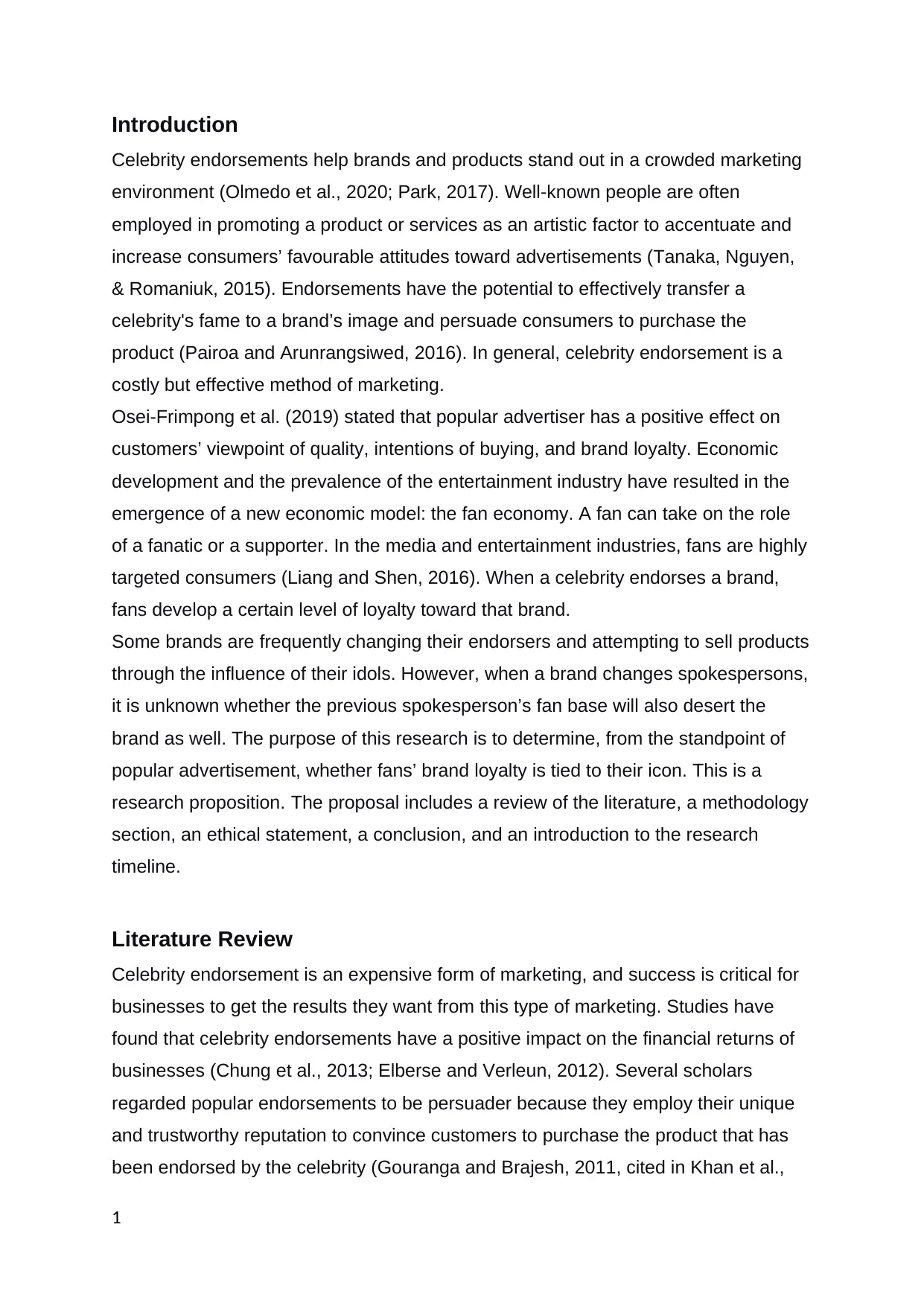
Introduction
Celebrity endorsements help brands and products stand out in a crowded marketing
environment (Olmedo et al., 2020; Park, 2017). Well-known people are often
employed in promoting a product or services as an artistic factor to accentuate and
increase consumers’ favourable attitudes toward advertisements (Tanaka, Nguyen,
& Romaniuk, 2015). Endorsements have the potential to effectively transfer a
celebrity's fame to a brand’s image and persuade consumers to purchase the
product (Pairoa and Arunrangsiwed, 2016). In general, celebrity endorsement is a
costly but effective method of marketing.
Osei-Frimpong et al. (2019) stated that popular advertiser has a positive effect on
customers’ viewpoint of quality, intentions of buying, and brand loyalty. Economic
development and the prevalence of the entertainment industry have resulted in the
emergence of a new economic model: the fan economy. A fan can take on the role
of a fanatic or a supporter. In the media and entertainment industries, fans are highly
targeted consumers (Liang and Shen, 2016). When a celebrity endorses a brand,
fans develop a certain level of loyalty toward that brand.
Some brands are frequently changing their endorsers and attempting to sell products
through the influence of their idols. However, when a brand changes spokespersons,
it is unknown whether the previous spokesperson’s fan base will also desert the
brand as well. The purpose of this research is to determine, from the standpoint of
popular advertisement, whether fans’ brand loyalty is tied to their icon. This is a
research proposition. The proposal includes a review of the literature, a methodology
section, an ethical statement, a conclusion, and an introduction to the research
timeline.
Literature Review
Celebrity endorsement is an expensive form of marketing, and success is critical for
businesses to get the results they want from this type of marketing. Studies have
found that celebrity endorsements have a positive impact on the financial returns of
businesses (Chung et al., 2013; Elberse and Verleun, 2012). Several scholars
regarded popular endorsements to be persuader because they employ their unique
and trustworthy reputation to convince customers to purchase the product that has
been endorsed by the celebrity (Gouranga and Brajesh, 2011, cited in Khan et al.,
1
Celebrity endorsements help brands and products stand out in a crowded marketing
environment (Olmedo et al., 2020; Park, 2017). Well-known people are often
employed in promoting a product or services as an artistic factor to accentuate and
increase consumers’ favourable attitudes toward advertisements (Tanaka, Nguyen,
& Romaniuk, 2015). Endorsements have the potential to effectively transfer a
celebrity's fame to a brand’s image and persuade consumers to purchase the
product (Pairoa and Arunrangsiwed, 2016). In general, celebrity endorsement is a
costly but effective method of marketing.
Osei-Frimpong et al. (2019) stated that popular advertiser has a positive effect on
customers’ viewpoint of quality, intentions of buying, and brand loyalty. Economic
development and the prevalence of the entertainment industry have resulted in the
emergence of a new economic model: the fan economy. A fan can take on the role
of a fanatic or a supporter. In the media and entertainment industries, fans are highly
targeted consumers (Liang and Shen, 2016). When a celebrity endorses a brand,
fans develop a certain level of loyalty toward that brand.
Some brands are frequently changing their endorsers and attempting to sell products
through the influence of their idols. However, when a brand changes spokespersons,
it is unknown whether the previous spokesperson’s fan base will also desert the
brand as well. The purpose of this research is to determine, from the standpoint of
popular advertisement, whether fans’ brand loyalty is tied to their icon. This is a
research proposition. The proposal includes a review of the literature, a methodology
section, an ethical statement, a conclusion, and an introduction to the research
timeline.
Literature Review
Celebrity endorsement is an expensive form of marketing, and success is critical for
businesses to get the results they want from this type of marketing. Studies have
found that celebrity endorsements have a positive impact on the financial returns of
businesses (Chung et al., 2013; Elberse and Verleun, 2012). Several scholars
regarded popular endorsements to be persuader because they employ their unique
and trustworthy reputation to convince customers to purchase the product that has
been endorsed by the celebrity (Gouranga and Brajesh, 2011, cited in Khan et al.,
1
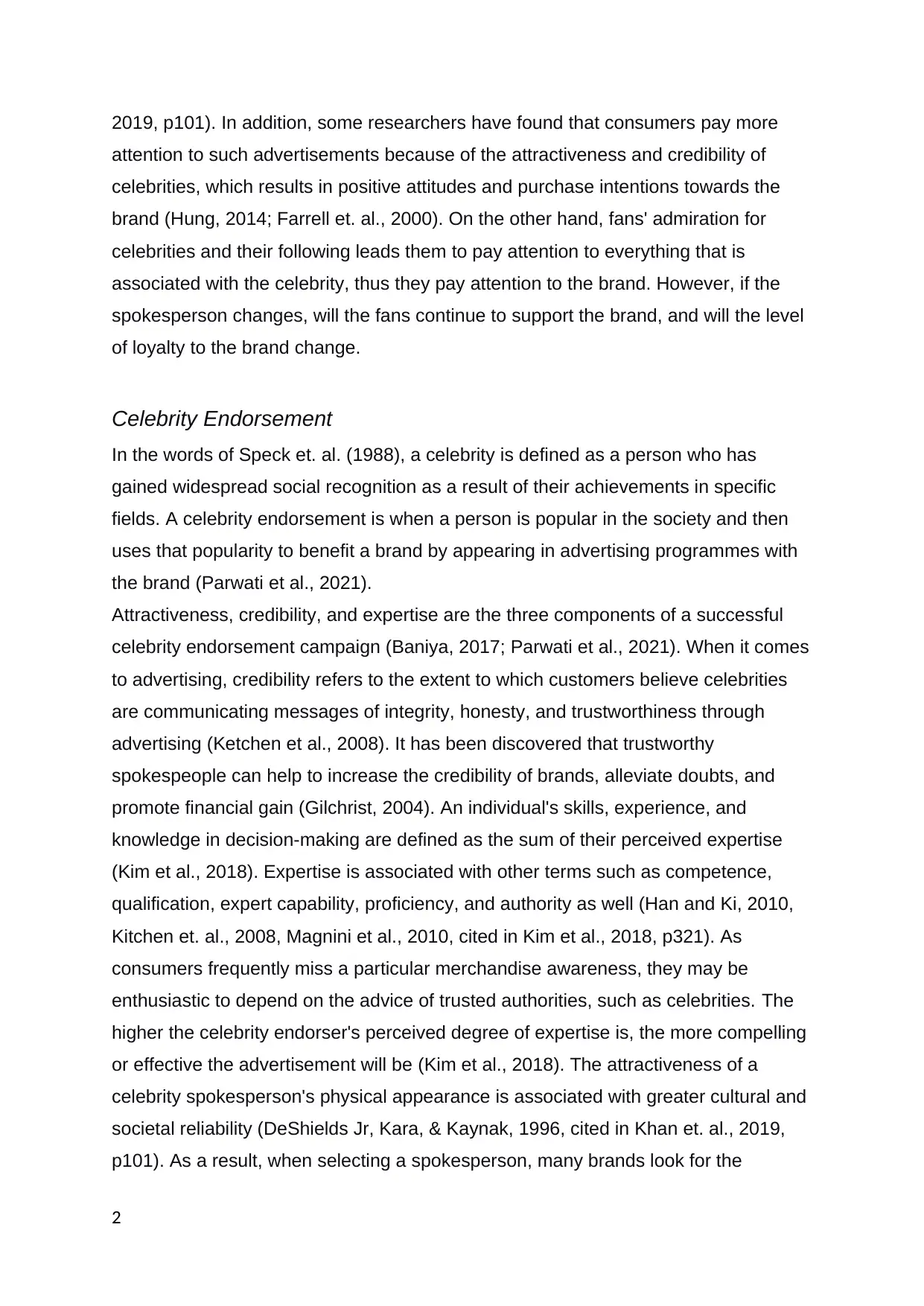
2019, p101). In addition, some researchers have found that consumers pay more
attention to such advertisements because of the attractiveness and credibility of
celebrities, which results in positive attitudes and purchase intentions towards the
brand (Hung, 2014; Farrell et. al., 2000). On the other hand, fans' admiration for
celebrities and their following leads them to pay attention to everything that is
associated with the celebrity, thus they pay attention to the brand. However, if the
spokesperson changes, will the fans continue to support the brand, and will the level
of loyalty to the brand change.
Celebrity Endorsement
In the words of Speck et. al. (1988), a celebrity is defined as a person who has
gained widespread social recognition as a result of their achievements in specific
fields. A celebrity endorsement is when a person is popular in the society and then
uses that popularity to benefit a brand by appearing in advertising programmes with
the brand (Parwati et al., 2021).
Attractiveness, credibility, and expertise are the three components of a successful
celebrity endorsement campaign (Baniya, 2017; Parwati et al., 2021). When it comes
to advertising, credibility refers to the extent to which customers believe celebrities
are communicating messages of integrity, honesty, and trustworthiness through
advertising (Ketchen et al., 2008). It has been discovered that trustworthy
spokespeople can help to increase the credibility of brands, alleviate doubts, and
promote financial gain (Gilchrist, 2004). An individual's skills, experience, and
knowledge in decision-making are defined as the sum of their perceived expertise
(Kim et al., 2018). Expertise is associated with other terms such as competence,
qualification, expert capability, proficiency, and authority as well (Han and Ki, 2010,
Kitchen et. al., 2008, Magnini et al., 2010, cited in Kim et al., 2018, p321). As
consumers frequently miss a particular merchandise awareness, they may be
enthusiastic to depend on the advice of trusted authorities, such as celebrities. The
higher the celebrity endorser's perceived degree of expertise is, the more compelling
or effective the advertisement will be (Kim et al., 2018). The attractiveness of a
celebrity spokesperson's physical appearance is associated with greater cultural and
societal reliability (DeShields Jr, Kara, & Kaynak, 1996, cited in Khan et. al., 2019,
p101). As a result, when selecting a spokesperson, many brands look for the
2
attention to such advertisements because of the attractiveness and credibility of
celebrities, which results in positive attitudes and purchase intentions towards the
brand (Hung, 2014; Farrell et. al., 2000). On the other hand, fans' admiration for
celebrities and their following leads them to pay attention to everything that is
associated with the celebrity, thus they pay attention to the brand. However, if the
spokesperson changes, will the fans continue to support the brand, and will the level
of loyalty to the brand change.
Celebrity Endorsement
In the words of Speck et. al. (1988), a celebrity is defined as a person who has
gained widespread social recognition as a result of their achievements in specific
fields. A celebrity endorsement is when a person is popular in the society and then
uses that popularity to benefit a brand by appearing in advertising programmes with
the brand (Parwati et al., 2021).
Attractiveness, credibility, and expertise are the three components of a successful
celebrity endorsement campaign (Baniya, 2017; Parwati et al., 2021). When it comes
to advertising, credibility refers to the extent to which customers believe celebrities
are communicating messages of integrity, honesty, and trustworthiness through
advertising (Ketchen et al., 2008). It has been discovered that trustworthy
spokespeople can help to increase the credibility of brands, alleviate doubts, and
promote financial gain (Gilchrist, 2004). An individual's skills, experience, and
knowledge in decision-making are defined as the sum of their perceived expertise
(Kim et al., 2018). Expertise is associated with other terms such as competence,
qualification, expert capability, proficiency, and authority as well (Han and Ki, 2010,
Kitchen et. al., 2008, Magnini et al., 2010, cited in Kim et al., 2018, p321). As
consumers frequently miss a particular merchandise awareness, they may be
enthusiastic to depend on the advice of trusted authorities, such as celebrities. The
higher the celebrity endorser's perceived degree of expertise is, the more compelling
or effective the advertisement will be (Kim et al., 2018). The attractiveness of a
celebrity spokesperson's physical appearance is associated with greater cultural and
societal reliability (DeShields Jr, Kara, & Kaynak, 1996, cited in Khan et. al., 2019,
p101). As a result, when selecting a spokesperson, many brands look for the
2
⊘ This is a preview!⊘
Do you want full access?
Subscribe today to unlock all pages.

Trusted by 1+ million students worldwide
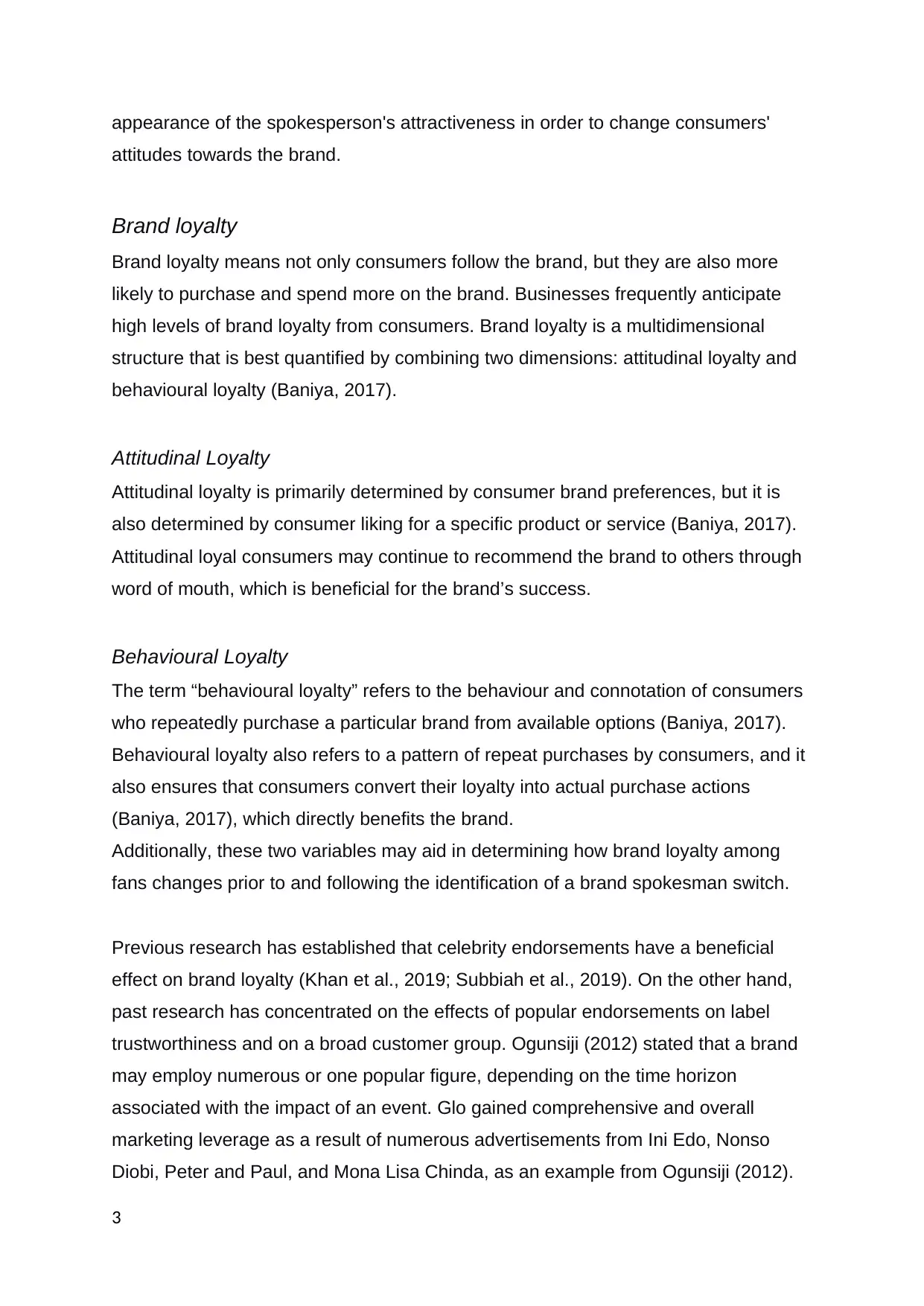
appearance of the spokesperson's attractiveness in order to change consumers'
attitudes towards the brand.
Brand loyalty
Brand loyalty means not only consumers follow the brand, but they are also more
likely to purchase and spend more on the brand. Businesses frequently anticipate
high levels of brand loyalty from consumers. Brand loyalty is a multidimensional
structure that is best quantified by combining two dimensions: attitudinal loyalty and
behavioural loyalty (Baniya, 2017).
Attitudinal Loyalty
Attitudinal loyalty is primarily determined by consumer brand preferences, but it is
also determined by consumer liking for a specific product or service (Baniya, 2017).
Attitudinal loyal consumers may continue to recommend the brand to others through
word of mouth, which is beneficial for the brand’s success.
Behavioural Loyalty
The term “behavioural loyalty” refers to the behaviour and connotation of consumers
who repeatedly purchase a particular brand from available options (Baniya, 2017).
Behavioural loyalty also refers to a pattern of repeat purchases by consumers, and it
also ensures that consumers convert their loyalty into actual purchase actions
(Baniya, 2017), which directly benefits the brand.
Additionally, these two variables may aid in determining how brand loyalty among
fans changes prior to and following the identification of a brand spokesman switch.
Previous research has established that celebrity endorsements have a beneficial
effect on brand loyalty (Khan et al., 2019; Subbiah et al., 2019). On the other hand,
past research has concentrated on the effects of popular endorsements on label
trustworthiness and on a broad customer group. Ogunsiji (2012) stated that a brand
may employ numerous or one popular figure, depending on the time horizon
associated with the impact of an event. Glo gained comprehensive and overall
marketing leverage as a result of numerous advertisements from Ini Edo, Nonso
Diobi, Peter and Paul, and Mona Lisa Chinda, as an example from Ogunsiji (2012).
3
attitudes towards the brand.
Brand loyalty
Brand loyalty means not only consumers follow the brand, but they are also more
likely to purchase and spend more on the brand. Businesses frequently anticipate
high levels of brand loyalty from consumers. Brand loyalty is a multidimensional
structure that is best quantified by combining two dimensions: attitudinal loyalty and
behavioural loyalty (Baniya, 2017).
Attitudinal Loyalty
Attitudinal loyalty is primarily determined by consumer brand preferences, but it is
also determined by consumer liking for a specific product or service (Baniya, 2017).
Attitudinal loyal consumers may continue to recommend the brand to others through
word of mouth, which is beneficial for the brand’s success.
Behavioural Loyalty
The term “behavioural loyalty” refers to the behaviour and connotation of consumers
who repeatedly purchase a particular brand from available options (Baniya, 2017).
Behavioural loyalty also refers to a pattern of repeat purchases by consumers, and it
also ensures that consumers convert their loyalty into actual purchase actions
(Baniya, 2017), which directly benefits the brand.
Additionally, these two variables may aid in determining how brand loyalty among
fans changes prior to and following the identification of a brand spokesman switch.
Previous research has established that celebrity endorsements have a beneficial
effect on brand loyalty (Khan et al., 2019; Subbiah et al., 2019). On the other hand,
past research has concentrated on the effects of popular endorsements on label
trustworthiness and on a broad customer group. Ogunsiji (2012) stated that a brand
may employ numerous or one popular figure, depending on the time horizon
associated with the impact of an event. Glo gained comprehensive and overall
marketing leverage as a result of numerous advertisements from Ini Edo, Nonso
Diobi, Peter and Paul, and Mona Lisa Chinda, as an example from Ogunsiji (2012).
3
Paraphrase This Document
Need a fresh take? Get an instant paraphrase of this document with our AI Paraphraser
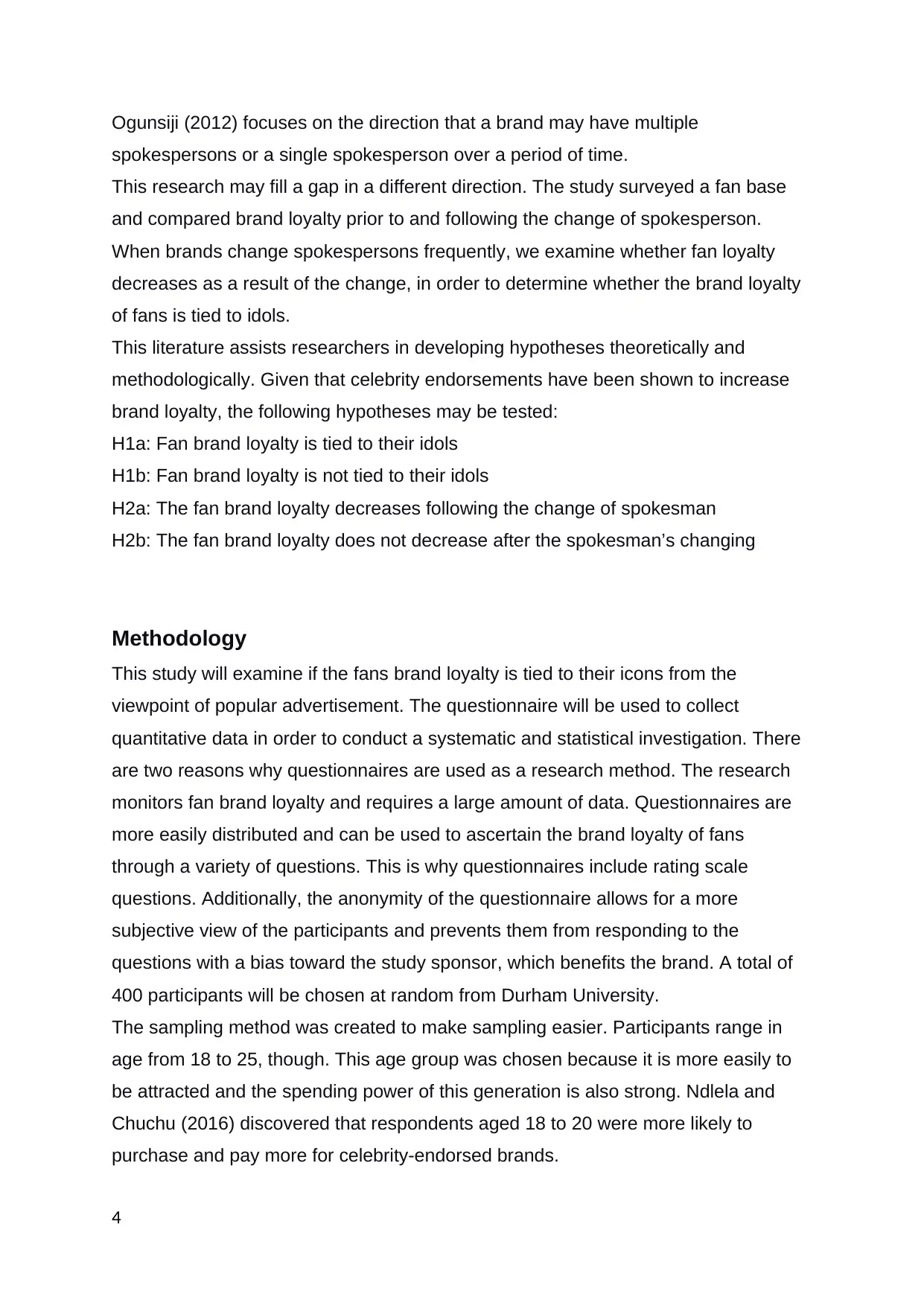
Ogunsiji (2012) focuses on the direction that a brand may have multiple
spokespersons or a single spokesperson over a period of time.
This research may fill a gap in a different direction. The study surveyed a fan base
and compared brand loyalty prior to and following the change of spokesperson.
When brands change spokespersons frequently, we examine whether fan loyalty
decreases as a result of the change, in order to determine whether the brand loyalty
of fans is tied to idols.
This literature assists researchers in developing hypotheses theoretically and
methodologically. Given that celebrity endorsements have been shown to increase
brand loyalty, the following hypotheses may be tested:
H1a: Fan brand loyalty is tied to their idols
H1b: Fan brand loyalty is not tied to their idols
H2a: The fan brand loyalty decreases following the change of spokesman
H2b: The fan brand loyalty does not decrease after the spokesman’s changing
Methodology
This study will examine if the fans brand loyalty is tied to their icons from the
viewpoint of popular advertisement. The questionnaire will be used to collect
quantitative data in order to conduct a systematic and statistical investigation. There
are two reasons why questionnaires are used as a research method. The research
monitors fan brand loyalty and requires a large amount of data. Questionnaires are
more easily distributed and can be used to ascertain the brand loyalty of fans
through a variety of questions. This is why questionnaires include rating scale
questions. Additionally, the anonymity of the questionnaire allows for a more
subjective view of the participants and prevents them from responding to the
questions with a bias toward the study sponsor, which benefits the brand. A total of
400 participants will be chosen at random from Durham University.
The sampling method was created to make sampling easier. Participants range in
age from 18 to 25, though. This age group was chosen because it is more easily to
be attracted and the spending power of this generation is also strong. Ndlela and
Chuchu (2016) discovered that respondents aged 18 to 20 were more likely to
purchase and pay more for celebrity-endorsed brands.
4
spokespersons or a single spokesperson over a period of time.
This research may fill a gap in a different direction. The study surveyed a fan base
and compared brand loyalty prior to and following the change of spokesperson.
When brands change spokespersons frequently, we examine whether fan loyalty
decreases as a result of the change, in order to determine whether the brand loyalty
of fans is tied to idols.
This literature assists researchers in developing hypotheses theoretically and
methodologically. Given that celebrity endorsements have been shown to increase
brand loyalty, the following hypotheses may be tested:
H1a: Fan brand loyalty is tied to their idols
H1b: Fan brand loyalty is not tied to their idols
H2a: The fan brand loyalty decreases following the change of spokesman
H2b: The fan brand loyalty does not decrease after the spokesman’s changing
Methodology
This study will examine if the fans brand loyalty is tied to their icons from the
viewpoint of popular advertisement. The questionnaire will be used to collect
quantitative data in order to conduct a systematic and statistical investigation. There
are two reasons why questionnaires are used as a research method. The research
monitors fan brand loyalty and requires a large amount of data. Questionnaires are
more easily distributed and can be used to ascertain the brand loyalty of fans
through a variety of questions. This is why questionnaires include rating scale
questions. Additionally, the anonymity of the questionnaire allows for a more
subjective view of the participants and prevents them from responding to the
questions with a bias toward the study sponsor, which benefits the brand. A total of
400 participants will be chosen at random from Durham University.
The sampling method was created to make sampling easier. Participants range in
age from 18 to 25, though. This age group was chosen because it is more easily to
be attracted and the spending power of this generation is also strong. Ndlela and
Chuchu (2016) discovered that respondents aged 18 to 20 were more likely to
purchase and pay more for celebrity-endorsed brands.
4
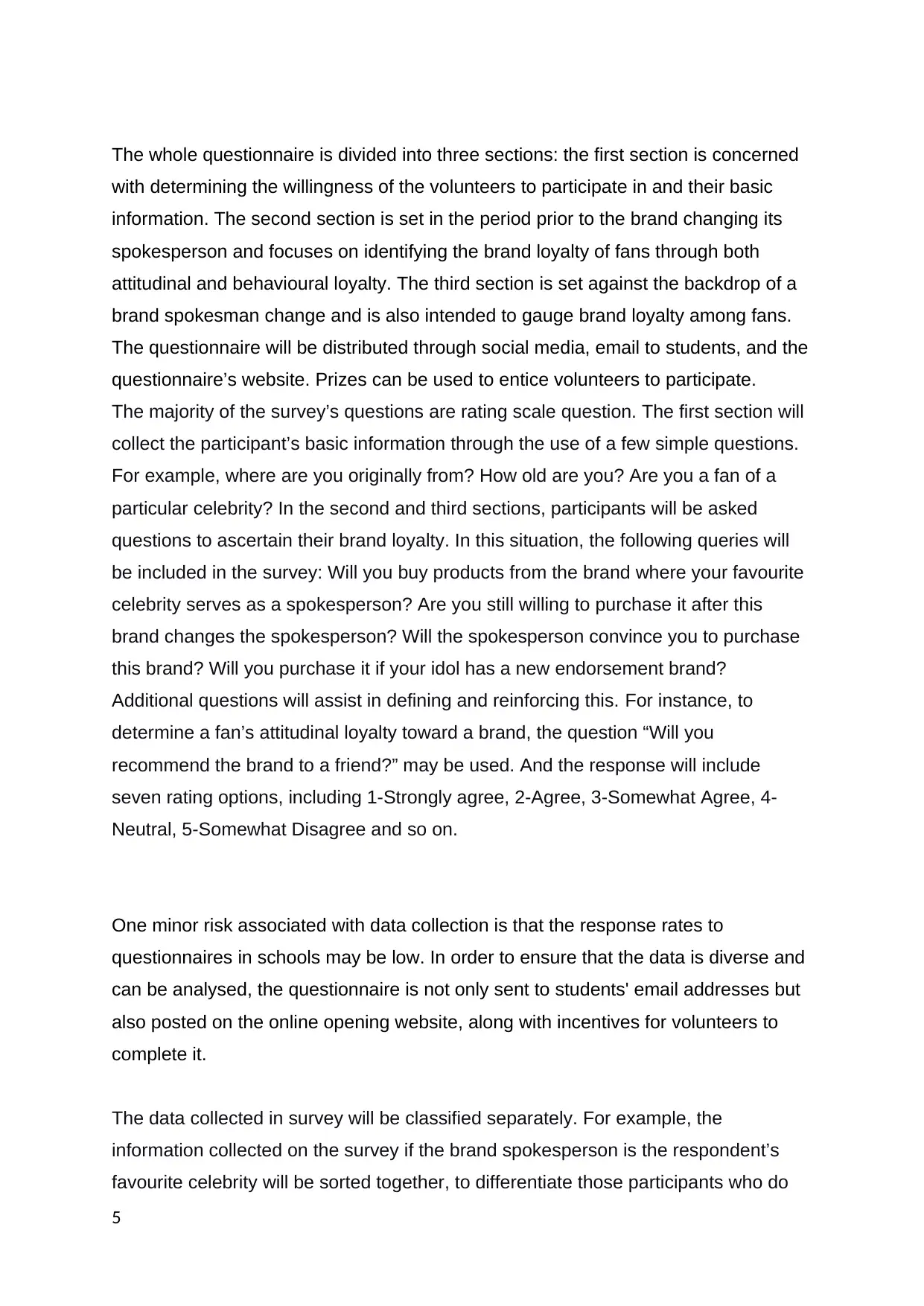
The whole questionnaire is divided into three sections: the first section is concerned
with determining the willingness of the volunteers to participate in and their basic
information. The second section is set in the period prior to the brand changing its
spokesperson and focuses on identifying the brand loyalty of fans through both
attitudinal and behavioural loyalty. The third section is set against the backdrop of a
brand spokesman change and is also intended to gauge brand loyalty among fans.
The questionnaire will be distributed through social media, email to students, and the
questionnaire’s website. Prizes can be used to entice volunteers to participate.
The majority of the survey’s questions are rating scale question. The first section will
collect the participant’s basic information through the use of a few simple questions.
For example, where are you originally from? How old are you? Are you a fan of a
particular celebrity? In the second and third sections, participants will be asked
questions to ascertain their brand loyalty. In this situation, the following queries will
be included in the survey: Will you buy products from the brand where your favourite
celebrity serves as a spokesperson? Are you still willing to purchase it after this
brand changes the spokesperson? Will the spokesperson convince you to purchase
this brand? Will you purchase it if your idol has a new endorsement brand?
Additional questions will assist in defining and reinforcing this. For instance, to
determine a fan’s attitudinal loyalty toward a brand, the question “Will you
recommend the brand to a friend?” may be used. And the response will include
seven rating options, including 1-Strongly agree, 2-Agree, 3-Somewhat Agree, 4-
Neutral, 5-Somewhat Disagree and so on.
One minor risk associated with data collection is that the response rates to
questionnaires in schools may be low. In order to ensure that the data is diverse and
can be analysed, the questionnaire is not only sent to students' email addresses but
also posted on the online opening website, along with incentives for volunteers to
complete it.
The data collected in survey will be classified separately. For example, the
information collected on the survey if the brand spokesperson is the respondent’s
favourite celebrity will be sorted together, to differentiate those participants who do
5
with determining the willingness of the volunteers to participate in and their basic
information. The second section is set in the period prior to the brand changing its
spokesperson and focuses on identifying the brand loyalty of fans through both
attitudinal and behavioural loyalty. The third section is set against the backdrop of a
brand spokesman change and is also intended to gauge brand loyalty among fans.
The questionnaire will be distributed through social media, email to students, and the
questionnaire’s website. Prizes can be used to entice volunteers to participate.
The majority of the survey’s questions are rating scale question. The first section will
collect the participant’s basic information through the use of a few simple questions.
For example, where are you originally from? How old are you? Are you a fan of a
particular celebrity? In the second and third sections, participants will be asked
questions to ascertain their brand loyalty. In this situation, the following queries will
be included in the survey: Will you buy products from the brand where your favourite
celebrity serves as a spokesperson? Are you still willing to purchase it after this
brand changes the spokesperson? Will the spokesperson convince you to purchase
this brand? Will you purchase it if your idol has a new endorsement brand?
Additional questions will assist in defining and reinforcing this. For instance, to
determine a fan’s attitudinal loyalty toward a brand, the question “Will you
recommend the brand to a friend?” may be used. And the response will include
seven rating options, including 1-Strongly agree, 2-Agree, 3-Somewhat Agree, 4-
Neutral, 5-Somewhat Disagree and so on.
One minor risk associated with data collection is that the response rates to
questionnaires in schools may be low. In order to ensure that the data is diverse and
can be analysed, the questionnaire is not only sent to students' email addresses but
also posted on the online opening website, along with incentives for volunteers to
complete it.
The data collected in survey will be classified separately. For example, the
information collected on the survey if the brand spokesperson is the respondent’s
favourite celebrity will be sorted together, to differentiate those participants who do
5
⊘ This is a preview!⊘
Do you want full access?
Subscribe today to unlock all pages.

Trusted by 1+ million students worldwide
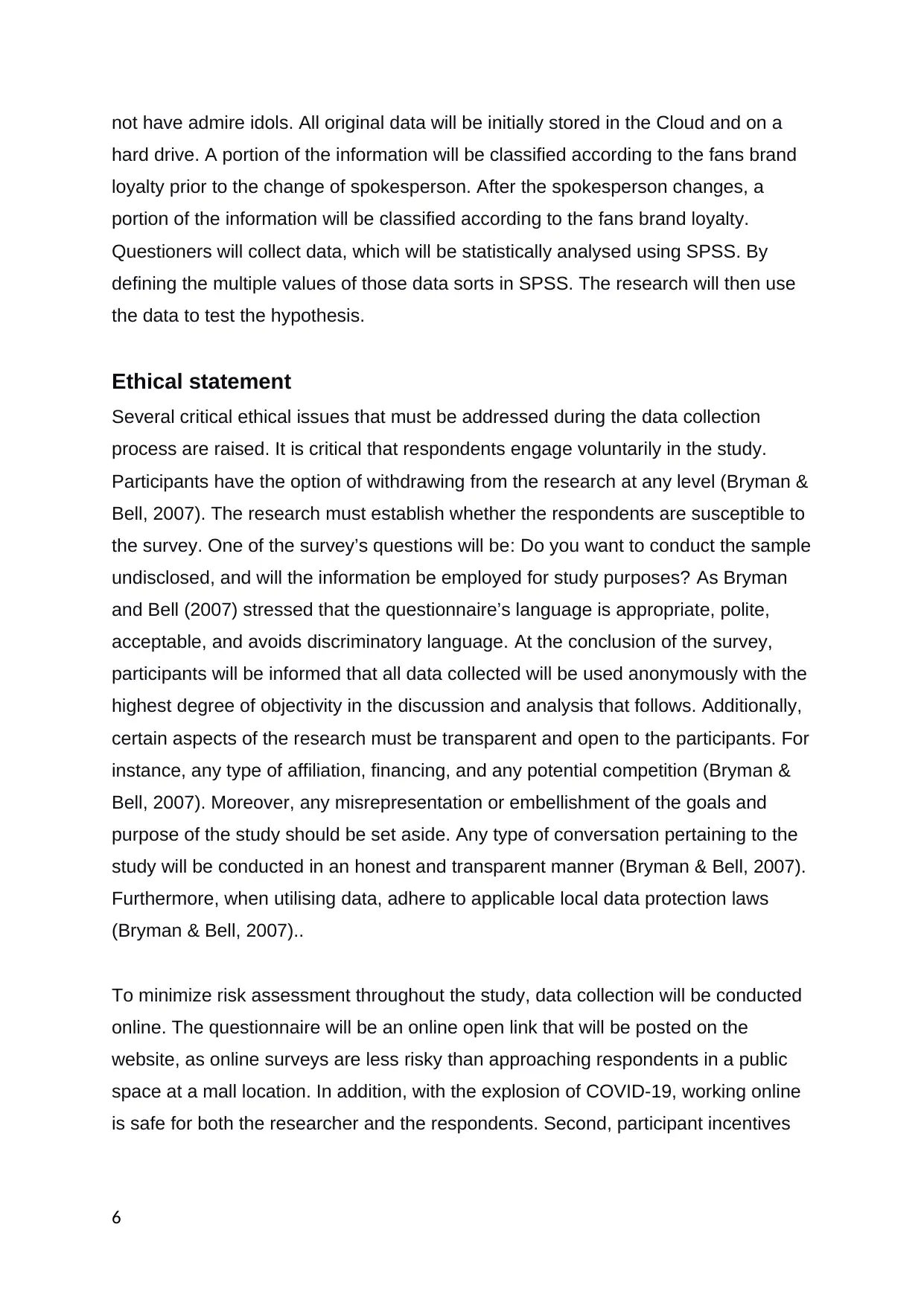
not have admire idols. All original data will be initially stored in the Cloud and on a
hard drive. A portion of the information will be classified according to the fans brand
loyalty prior to the change of spokesperson. After the spokesperson changes, a
portion of the information will be classified according to the fans brand loyalty.
Questioners will collect data, which will be statistically analysed using SPSS. By
defining the multiple values of those data sorts in SPSS. The research will then use
the data to test the hypothesis.
Ethical statement
Several critical ethical issues that must be addressed during the data collection
process are raised. It is critical that respondents engage voluntarily in the study.
Participants have the option of withdrawing from the research at any level (Bryman &
Bell, 2007). The research must establish whether the respondents are susceptible to
the survey. One of the survey’s questions will be: Do you want to conduct the sample
undisclosed, and will the information be employed for study purposes? As Bryman
and Bell (2007) stressed that the questionnaire’s language is appropriate, polite,
acceptable, and avoids discriminatory language. At the conclusion of the survey,
participants will be informed that all data collected will be used anonymously with the
highest degree of objectivity in the discussion and analysis that follows. Additionally,
certain aspects of the research must be transparent and open to the participants. For
instance, any type of affiliation, financing, and any potential competition (Bryman &
Bell, 2007). Moreover, any misrepresentation or embellishment of the goals and
purpose of the study should be set aside. Any type of conversation pertaining to the
study will be conducted in an honest and transparent manner (Bryman & Bell, 2007).
Furthermore, when utilising data, adhere to applicable local data protection laws
(Bryman & Bell, 2007)..
To minimize risk assessment throughout the study, data collection will be conducted
online. The questionnaire will be an online open link that will be posted on the
website, as online surveys are less risky than approaching respondents in a public
space at a mall location. In addition, with the explosion of COVID-19, working online
is safe for both the researcher and the respondents. Second, participant incentives
6
hard drive. A portion of the information will be classified according to the fans brand
loyalty prior to the change of spokesperson. After the spokesperson changes, a
portion of the information will be classified according to the fans brand loyalty.
Questioners will collect data, which will be statistically analysed using SPSS. By
defining the multiple values of those data sorts in SPSS. The research will then use
the data to test the hypothesis.
Ethical statement
Several critical ethical issues that must be addressed during the data collection
process are raised. It is critical that respondents engage voluntarily in the study.
Participants have the option of withdrawing from the research at any level (Bryman &
Bell, 2007). The research must establish whether the respondents are susceptible to
the survey. One of the survey’s questions will be: Do you want to conduct the sample
undisclosed, and will the information be employed for study purposes? As Bryman
and Bell (2007) stressed that the questionnaire’s language is appropriate, polite,
acceptable, and avoids discriminatory language. At the conclusion of the survey,
participants will be informed that all data collected will be used anonymously with the
highest degree of objectivity in the discussion and analysis that follows. Additionally,
certain aspects of the research must be transparent and open to the participants. For
instance, any type of affiliation, financing, and any potential competition (Bryman &
Bell, 2007). Moreover, any misrepresentation or embellishment of the goals and
purpose of the study should be set aside. Any type of conversation pertaining to the
study will be conducted in an honest and transparent manner (Bryman & Bell, 2007).
Furthermore, when utilising data, adhere to applicable local data protection laws
(Bryman & Bell, 2007)..
To minimize risk assessment throughout the study, data collection will be conducted
online. The questionnaire will be an online open link that will be posted on the
website, as online surveys are less risky than approaching respondents in a public
space at a mall location. In addition, with the explosion of COVID-19, working online
is safe for both the researcher and the respondents. Second, participant incentives
6
Paraphrase This Document
Need a fresh take? Get an instant paraphrase of this document with our AI Paraphraser
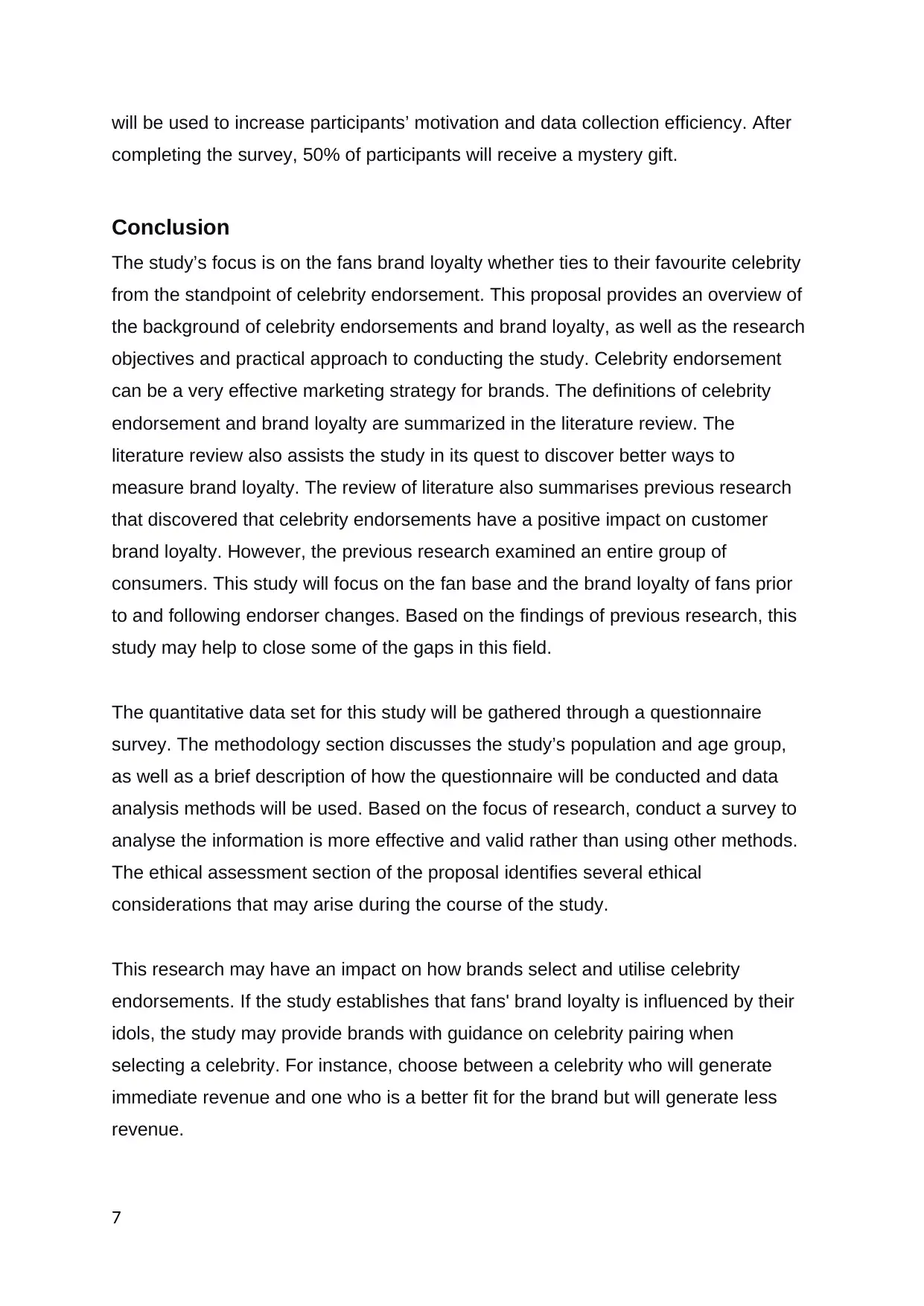
will be used to increase participants’ motivation and data collection efficiency. After
completing the survey, 50% of participants will receive a mystery gift.
Conclusion
The study’s focus is on the fans brand loyalty whether ties to their favourite celebrity
from the standpoint of celebrity endorsement. This proposal provides an overview of
the background of celebrity endorsements and brand loyalty, as well as the research
objectives and practical approach to conducting the study. Celebrity endorsement
can be a very effective marketing strategy for brands. The definitions of celebrity
endorsement and brand loyalty are summarized in the literature review. The
literature review also assists the study in its quest to discover better ways to
measure brand loyalty. The review of literature also summarises previous research
that discovered that celebrity endorsements have a positive impact on customer
brand loyalty. However, the previous research examined an entire group of
consumers. This study will focus on the fan base and the brand loyalty of fans prior
to and following endorser changes. Based on the findings of previous research, this
study may help to close some of the gaps in this field.
The quantitative data set for this study will be gathered through a questionnaire
survey. The methodology section discusses the study’s population and age group,
as well as a brief description of how the questionnaire will be conducted and data
analysis methods will be used. Based on the focus of research, conduct a survey to
analyse the information is more effective and valid rather than using other methods.
The ethical assessment section of the proposal identifies several ethical
considerations that may arise during the course of the study.
This research may have an impact on how brands select and utilise celebrity
endorsements. If the study establishes that fans' brand loyalty is influenced by their
idols, the study may provide brands with guidance on celebrity pairing when
selecting a celebrity. For instance, choose between a celebrity who will generate
immediate revenue and one who is a better fit for the brand but will generate less
revenue.
7
completing the survey, 50% of participants will receive a mystery gift.
Conclusion
The study’s focus is on the fans brand loyalty whether ties to their favourite celebrity
from the standpoint of celebrity endorsement. This proposal provides an overview of
the background of celebrity endorsements and brand loyalty, as well as the research
objectives and practical approach to conducting the study. Celebrity endorsement
can be a very effective marketing strategy for brands. The definitions of celebrity
endorsement and brand loyalty are summarized in the literature review. The
literature review also assists the study in its quest to discover better ways to
measure brand loyalty. The review of literature also summarises previous research
that discovered that celebrity endorsements have a positive impact on customer
brand loyalty. However, the previous research examined an entire group of
consumers. This study will focus on the fan base and the brand loyalty of fans prior
to and following endorser changes. Based on the findings of previous research, this
study may help to close some of the gaps in this field.
The quantitative data set for this study will be gathered through a questionnaire
survey. The methodology section discusses the study’s population and age group,
as well as a brief description of how the questionnaire will be conducted and data
analysis methods will be used. Based on the focus of research, conduct a survey to
analyse the information is more effective and valid rather than using other methods.
The ethical assessment section of the proposal identifies several ethical
considerations that may arise during the course of the study.
This research may have an impact on how brands select and utilise celebrity
endorsements. If the study establishes that fans' brand loyalty is influenced by their
idols, the study may provide brands with guidance on celebrity pairing when
selecting a celebrity. For instance, choose between a celebrity who will generate
immediate revenue and one who is a better fit for the brand but will generate less
revenue.
7
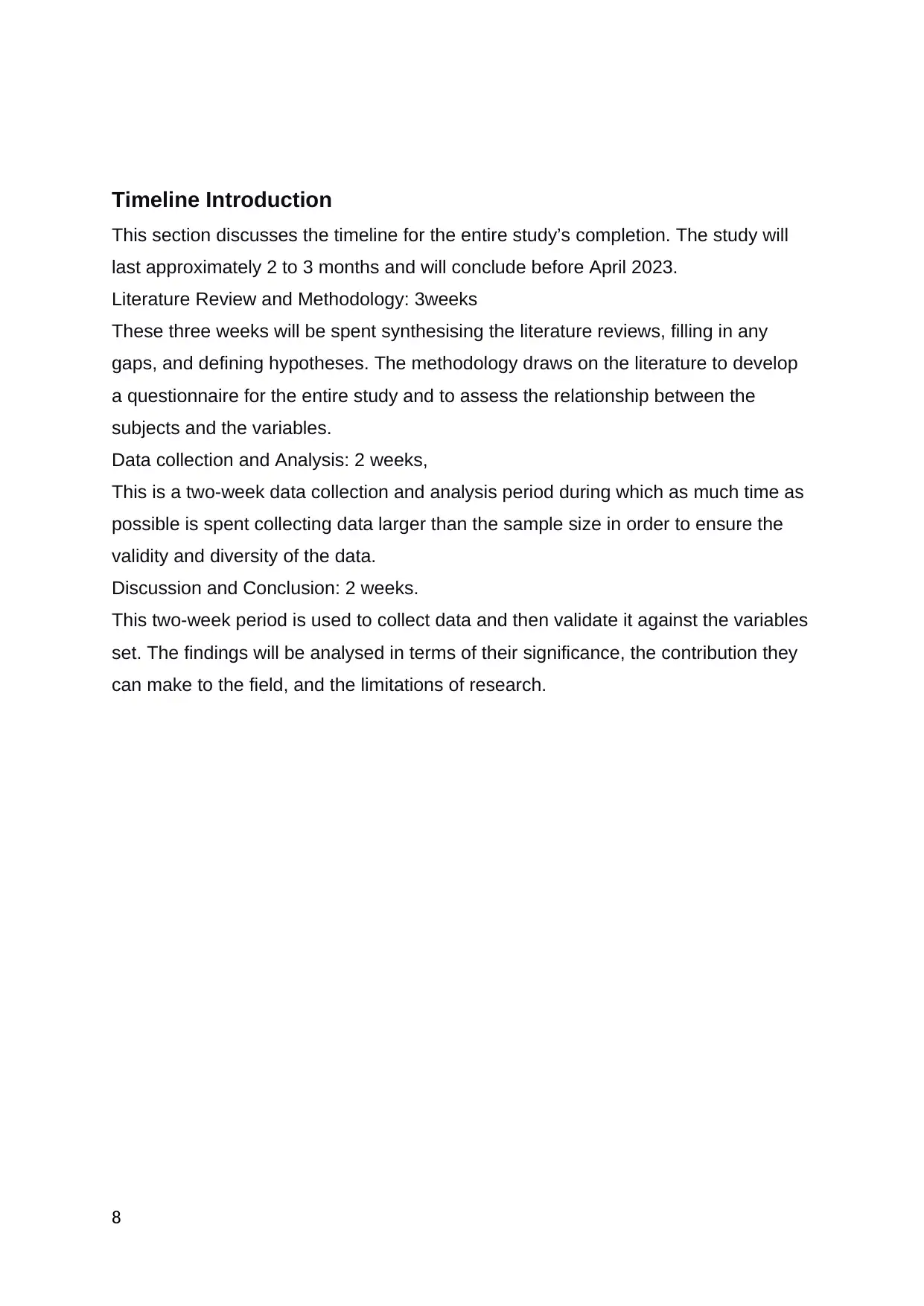
Timeline Introduction
This section discusses the timeline for the entire study’s completion. The study will
last approximately 2 to 3 months and will conclude before April 2023.
Literature Review and Methodology: 3weeks
These three weeks will be spent synthesising the literature reviews, filling in any
gaps, and defining hypotheses. The methodology draws on the literature to develop
a questionnaire for the entire study and to assess the relationship between the
subjects and the variables.
Data collection and Analysis: 2 weeks,
This is a two-week data collection and analysis period during which as much time as
possible is spent collecting data larger than the sample size in order to ensure the
validity and diversity of the data.
Discussion and Conclusion: 2 weeks.
This two-week period is used to collect data and then validate it against the variables
set. The findings will be analysed in terms of their significance, the contribution they
can make to the field, and the limitations of research.
8
This section discusses the timeline for the entire study’s completion. The study will
last approximately 2 to 3 months and will conclude before April 2023.
Literature Review and Methodology: 3weeks
These three weeks will be spent synthesising the literature reviews, filling in any
gaps, and defining hypotheses. The methodology draws on the literature to develop
a questionnaire for the entire study and to assess the relationship between the
subjects and the variables.
Data collection and Analysis: 2 weeks,
This is a two-week data collection and analysis period during which as much time as
possible is spent collecting data larger than the sample size in order to ensure the
validity and diversity of the data.
Discussion and Conclusion: 2 weeks.
This two-week period is used to collect data and then validate it against the variables
set. The findings will be analysed in terms of their significance, the contribution they
can make to the field, and the limitations of research.
8
⊘ This is a preview!⊘
Do you want full access?
Subscribe today to unlock all pages.

Trusted by 1+ million students worldwide
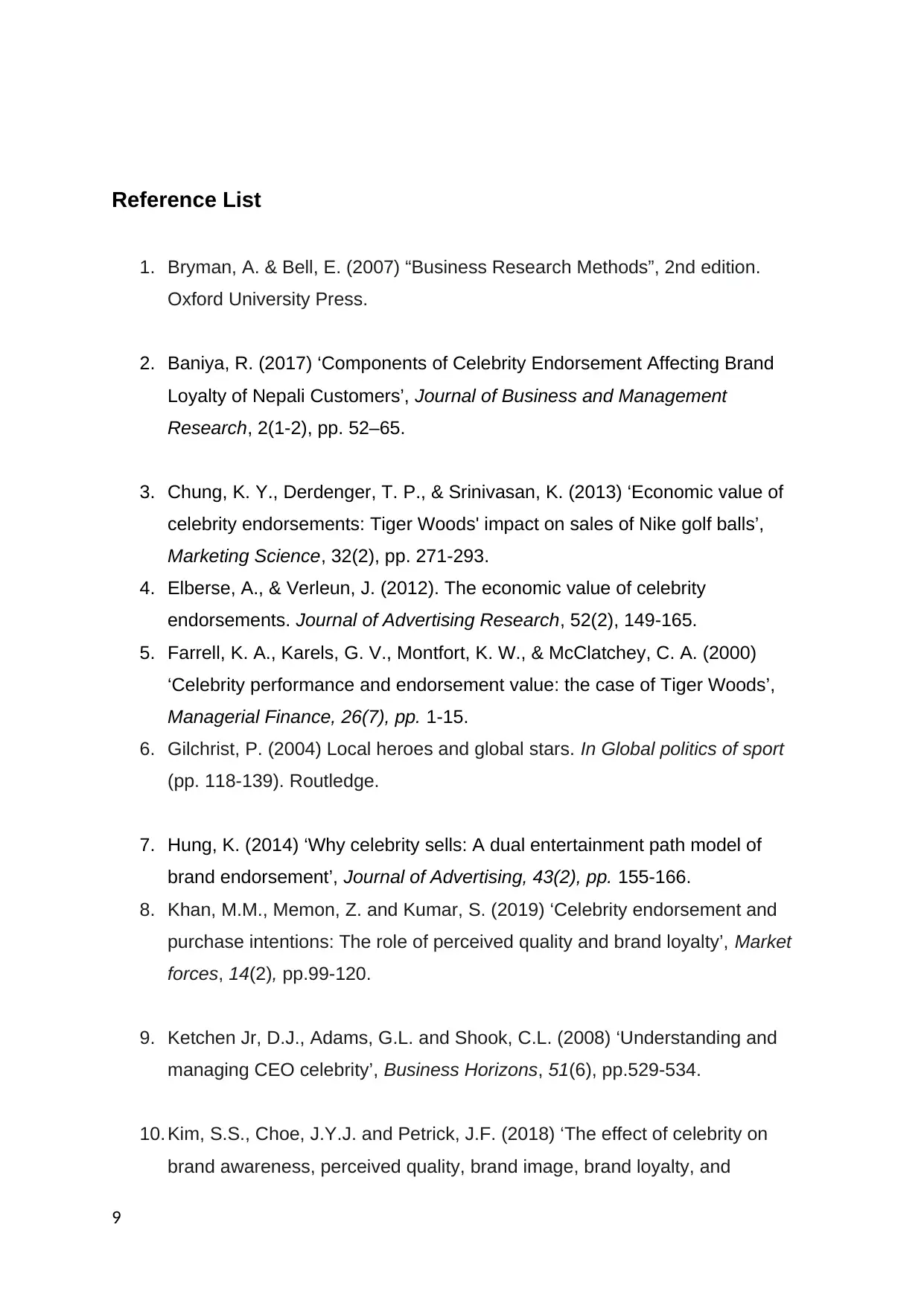
Reference List
1. Bryman, A. & Bell, E. (2007) “Business Research Methods”, 2nd edition.
Oxford University Press.
2. Baniya, R. (2017) ‘Components of Celebrity Endorsement Affecting Brand
Loyalty of Nepali Customers’, Journal of Business and Management
Research, 2(1-2), pp. 52–65.
3. Chung, K. Y., Derdenger, T. P., & Srinivasan, K. (2013) ‘Economic value of
celebrity endorsements: Tiger Woods' impact on sales of Nike golf balls’,
Marketing Science, 32(2), pp. 271-293.
4. Elberse, A., & Verleun, J. (2012). The economic value of celebrity
endorsements. Journal of Advertising Research, 52(2), 149-165.
5. Farrell, K. A., Karels, G. V., Montfort, K. W., & McClatchey, C. A. (2000)
‘Celebrity performance and endorsement value: the case of Tiger Woods’,
Managerial Finance, 26(7), pp. 1-15.
6. Gilchrist, P. (2004) Local heroes and global stars. In Global politics of sport
(pp. 118-139). Routledge.
7. Hung, K. (2014) ‘Why celebrity sells: A dual entertainment path model of
brand endorsement’, Journal of Advertising, 43(2), pp. 155-166.
8. Khan, M.M., Memon, Z. and Kumar, S. (2019) ‘Celebrity endorsement and
purchase intentions: The role of perceived quality and brand loyalty’, Market
forces, 14(2), pp.99-120.
9. Ketchen Jr, D.J., Adams, G.L. and Shook, C.L. (2008) ‘Understanding and
managing CEO celebrity’, Business Horizons, 51(6), pp.529-534.
10. Kim, S.S., Choe, J.Y.J. and Petrick, J.F. (2018) ‘The effect of celebrity on
brand awareness, perceived quality, brand image, brand loyalty, and
9
1. Bryman, A. & Bell, E. (2007) “Business Research Methods”, 2nd edition.
Oxford University Press.
2. Baniya, R. (2017) ‘Components of Celebrity Endorsement Affecting Brand
Loyalty of Nepali Customers’, Journal of Business and Management
Research, 2(1-2), pp. 52–65.
3. Chung, K. Y., Derdenger, T. P., & Srinivasan, K. (2013) ‘Economic value of
celebrity endorsements: Tiger Woods' impact on sales of Nike golf balls’,
Marketing Science, 32(2), pp. 271-293.
4. Elberse, A., & Verleun, J. (2012). The economic value of celebrity
endorsements. Journal of Advertising Research, 52(2), 149-165.
5. Farrell, K. A., Karels, G. V., Montfort, K. W., & McClatchey, C. A. (2000)
‘Celebrity performance and endorsement value: the case of Tiger Woods’,
Managerial Finance, 26(7), pp. 1-15.
6. Gilchrist, P. (2004) Local heroes and global stars. In Global politics of sport
(pp. 118-139). Routledge.
7. Hung, K. (2014) ‘Why celebrity sells: A dual entertainment path model of
brand endorsement’, Journal of Advertising, 43(2), pp. 155-166.
8. Khan, M.M., Memon, Z. and Kumar, S. (2019) ‘Celebrity endorsement and
purchase intentions: The role of perceived quality and brand loyalty’, Market
forces, 14(2), pp.99-120.
9. Ketchen Jr, D.J., Adams, G.L. and Shook, C.L. (2008) ‘Understanding and
managing CEO celebrity’, Business Horizons, 51(6), pp.529-534.
10. Kim, S.S., Choe, J.Y.J. and Petrick, J.F. (2018) ‘The effect of celebrity on
brand awareness, perceived quality, brand image, brand loyalty, and
9
Paraphrase This Document
Need a fresh take? Get an instant paraphrase of this document with our AI Paraphraser
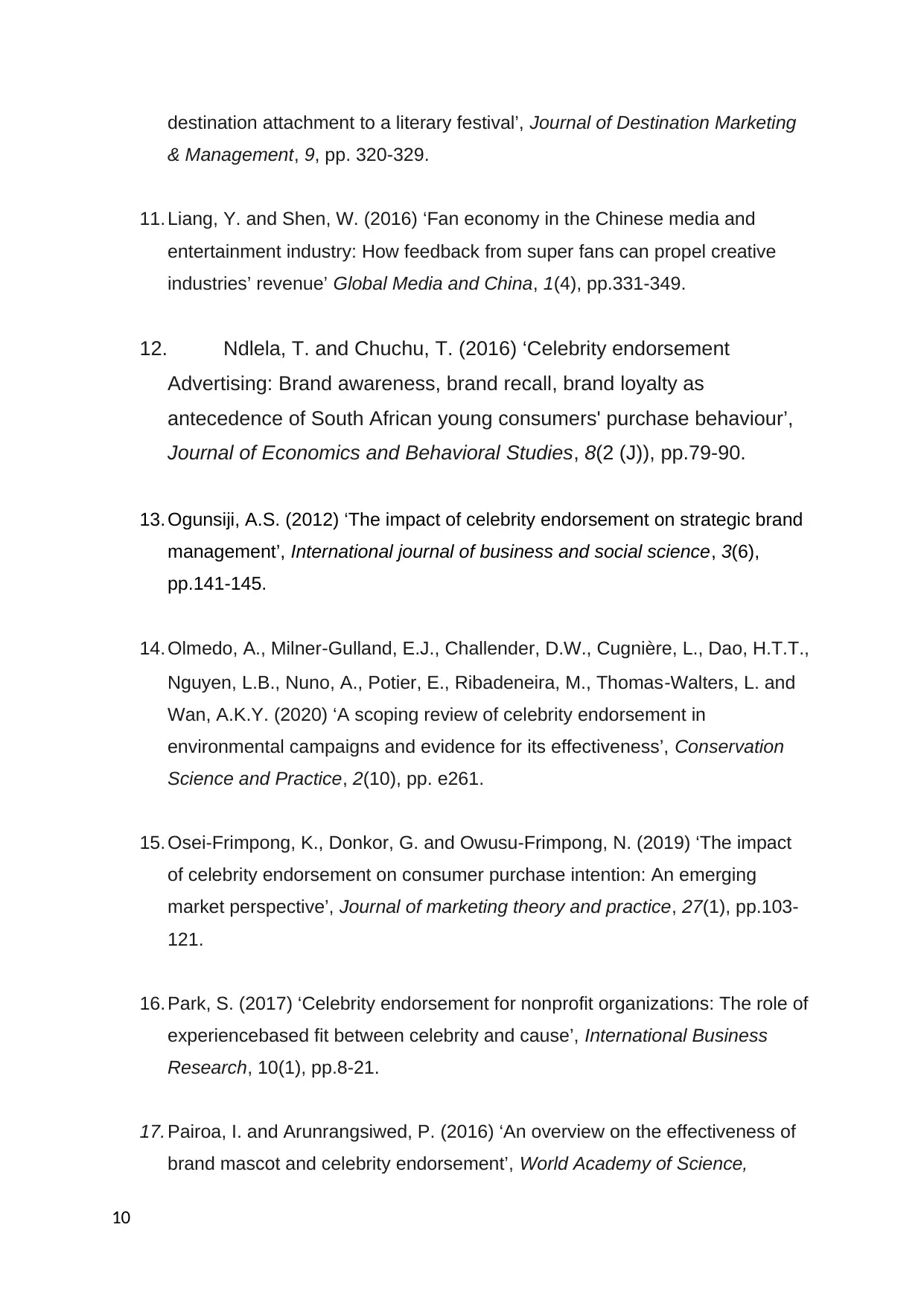
destination attachment to a literary festival’, Journal of Destination Marketing
& Management, 9, pp. 320-329.
11. Liang, Y. and Shen, W. (2016) ‘Fan economy in the Chinese media and
entertainment industry: How feedback from super fans can propel creative
industries’ revenue’ Global Media and China, 1(4), pp.331-349.
12. Ndlela, T. and Chuchu, T. (2016) ‘Celebrity endorsement
Advertising: Brand awareness, brand recall, brand loyalty as
antecedence of South African young consumers' purchase behaviour’,
Journal of Economics and Behavioral Studies, 8(2 (J)), pp.79-90.
13. Ogunsiji, A.S. (2012) ‘The impact of celebrity endorsement on strategic brand
management’, International journal of business and social science, 3(6),
pp.141-145.
14. Olmedo, A., Milner‐Gulland, E.J., Challender, D.W., Cugnière, L., Dao, H.T.T.,
Nguyen, L.B., Nuno, A., Potier, E., Ribadeneira, M., Thomas‐Walters, L. and
Wan, A.K.Y. (2020) ‘A scoping review of celebrity endorsement in
environmental campaigns and evidence for its effectiveness’, Conservation
Science and Practice, 2(10), pp. e261.
15. Osei-Frimpong, K., Donkor, G. and Owusu-Frimpong, N. (2019) ‘The impact
of celebrity endorsement on consumer purchase intention: An emerging
market perspective’, Journal of marketing theory and practice, 27(1), pp.103-
121.
16. Park, S. (2017) ‘Celebrity endorsement for nonprofit organizations: The role of
experiencebased fit between celebrity and cause’, International Business
Research, 10(1), pp.8-21.
17. Pairoa, I. and Arunrangsiwed, P. (2016) ‘An overview on the effectiveness of
brand mascot and celebrity endorsement’, World Academy of Science,
10
& Management, 9, pp. 320-329.
11. Liang, Y. and Shen, W. (2016) ‘Fan economy in the Chinese media and
entertainment industry: How feedback from super fans can propel creative
industries’ revenue’ Global Media and China, 1(4), pp.331-349.
12. Ndlela, T. and Chuchu, T. (2016) ‘Celebrity endorsement
Advertising: Brand awareness, brand recall, brand loyalty as
antecedence of South African young consumers' purchase behaviour’,
Journal of Economics and Behavioral Studies, 8(2 (J)), pp.79-90.
13. Ogunsiji, A.S. (2012) ‘The impact of celebrity endorsement on strategic brand
management’, International journal of business and social science, 3(6),
pp.141-145.
14. Olmedo, A., Milner‐Gulland, E.J., Challender, D.W., Cugnière, L., Dao, H.T.T.,
Nguyen, L.B., Nuno, A., Potier, E., Ribadeneira, M., Thomas‐Walters, L. and
Wan, A.K.Y. (2020) ‘A scoping review of celebrity endorsement in
environmental campaigns and evidence for its effectiveness’, Conservation
Science and Practice, 2(10), pp. e261.
15. Osei-Frimpong, K., Donkor, G. and Owusu-Frimpong, N. (2019) ‘The impact
of celebrity endorsement on consumer purchase intention: An emerging
market perspective’, Journal of marketing theory and practice, 27(1), pp.103-
121.
16. Park, S. (2017) ‘Celebrity endorsement for nonprofit organizations: The role of
experiencebased fit between celebrity and cause’, International Business
Research, 10(1), pp.8-21.
17. Pairoa, I. and Arunrangsiwed, P. (2016) ‘An overview on the effectiveness of
brand mascot and celebrity endorsement’, World Academy of Science,
10
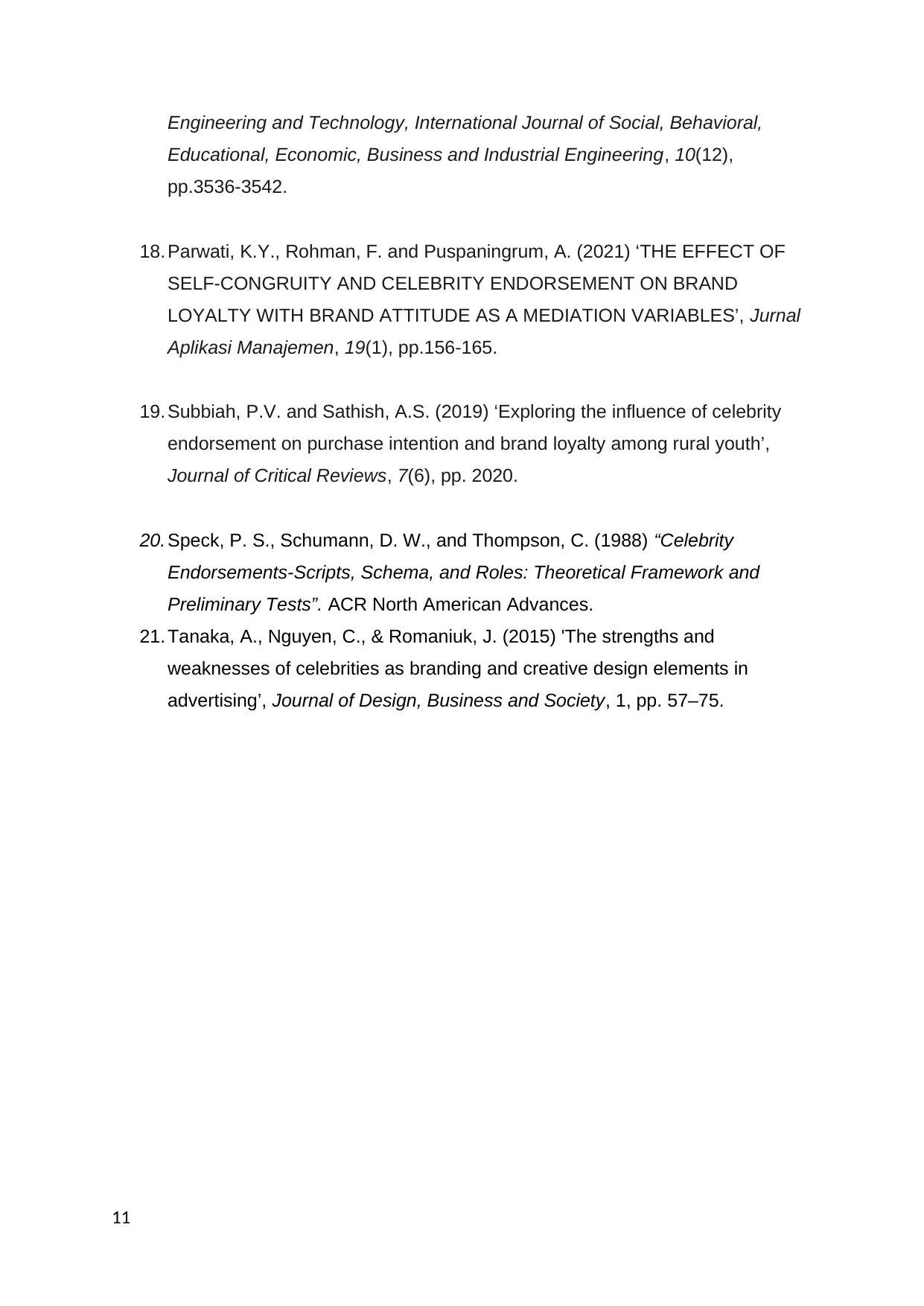
Engineering and Technology, International Journal of Social, Behavioral,
Educational, Economic, Business and Industrial Engineering, 10(12),
pp.3536-3542.
18. Parwati, K.Y., Rohman, F. and Puspaningrum, A. (2021) ‘THE EFFECT OF
SELF-CONGRUITY AND CELEBRITY ENDORSEMENT ON BRAND
LOYALTY WITH BRAND ATTITUDE AS A MEDIATION VARIABLES’, Jurnal
Aplikasi Manajemen, 19(1), pp.156-165.
19. Subbiah, P.V. and Sathish, A.S. (2019) ‘Exploring the influence of celebrity
endorsement on purchase intention and brand loyalty among rural youth’,
Journal of Critical Reviews, 7(6), pp. 2020.
20. Speck, P. S., Schumann, D. W., and Thompson, C. (1988) “Celebrity
Endorsements-Scripts, Schema, and Roles: Theoretical Framework and
Preliminary Tests”. ACR North American Advances.
21. Tanaka, A., Nguyen, C., & Romaniuk, J. (2015) 'The strengths and
weaknesses of celebrities as branding and creative design elements in
advertising’, Journal of Design, Business and Society, 1, pp. 57–75.
11
Educational, Economic, Business and Industrial Engineering, 10(12),
pp.3536-3542.
18. Parwati, K.Y., Rohman, F. and Puspaningrum, A. (2021) ‘THE EFFECT OF
SELF-CONGRUITY AND CELEBRITY ENDORSEMENT ON BRAND
LOYALTY WITH BRAND ATTITUDE AS A MEDIATION VARIABLES’, Jurnal
Aplikasi Manajemen, 19(1), pp.156-165.
19. Subbiah, P.V. and Sathish, A.S. (2019) ‘Exploring the influence of celebrity
endorsement on purchase intention and brand loyalty among rural youth’,
Journal of Critical Reviews, 7(6), pp. 2020.
20. Speck, P. S., Schumann, D. W., and Thompson, C. (1988) “Celebrity
Endorsements-Scripts, Schema, and Roles: Theoretical Framework and
Preliminary Tests”. ACR North American Advances.
21. Tanaka, A., Nguyen, C., & Romaniuk, J. (2015) 'The strengths and
weaknesses of celebrities as branding and creative design elements in
advertising’, Journal of Design, Business and Society, 1, pp. 57–75.
11
⊘ This is a preview!⊘
Do you want full access?
Subscribe today to unlock all pages.

Trusted by 1+ million students worldwide
1 out of 12
Related Documents
Your All-in-One AI-Powered Toolkit for Academic Success.
+13062052269
info@desklib.com
Available 24*7 on WhatsApp / Email
![[object Object]](/_next/static/media/star-bottom.7253800d.svg)
Unlock your academic potential
Copyright © 2020–2026 A2Z Services. All Rights Reserved. Developed and managed by ZUCOL.





